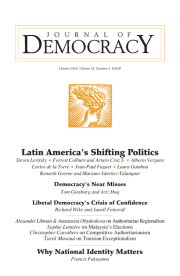Portuguese “immunity” to populism has been strong, compared to the trends in other European Union member states, Isabel Marques da Silva writes for Euronews:
But mainstream political parties should be vigilant says João Tiago Gaspar, a political scientist with the Fundação Francisco Manuel dos Santos.
“There is no party represented in Parliament that has such a speech, but we are not exempt from this possibility, especially since we know that in Portugal people are very disconnected from politics. They support democracy as an ideal regime, but they do not rely on the parties or, necessarily, on the rulers. Those doses of mistrust may one day be channeled by someone who has sufficient media status to do so,” he notes.
 Observers are sounding the alarm bell that we are amid an era of resurgent authoritarianism as a number of developments give cause for concern for global democracy, notes Erica Frantz, Assistant Professor in the Political Science Department at Michigan State University, and author of Authoritarianism: What Everyone Needs to Know.
Observers are sounding the alarm bell that we are amid an era of resurgent authoritarianism as a number of developments give cause for concern for global democracy, notes Erica Frantz, Assistant Professor in the Political Science Department at Michigan State University, and author of Authoritarianism: What Everyone Needs to Know.
The first is the growing attractiveness of populism among democratic audiences, she writes for the OUP blog:
- The rising popularity of populism worldwide is troubling… because populist agendas are increasingly being used as a springboard for the dismantling of democracy, such as occurred in Venezuela under Hugo Chavez and Turkey under Recep Tayyip Erdogan. In such places, populist leaders dismantle the foundations of democracy by putting loyalists in key positions of power (e.g. the judiciary), sidelining the media by censoring it or legislating against it, and muzzling civil society and political opponents. Importantly, their efforts to consolidate control are often difficult to push back against because they occur under the guise of “saving” the country.
 Relatedly, a second cause for concern is the increasing reliance on pseudo-democratic tactics as a tool for maintaining power among today’s authoritarian regimes. Examples include not only the adoption of elections, incorporation of multiple political parties, and maintenance of legislatures, but also the creation of non-governmental organizations (which are actually government sponsored) to feign support for civil society, establishment of consultative forums to co-opt potential opposition, and use of fake election monitoring groups to validate what are actually unfair contests. Today’s authoritarian regimes are wise to engage in such actions. Those dictatorships that more closely mimic the behaviors of democracies last longer than their more traditional counterparts. ….
Relatedly, a second cause for concern is the increasing reliance on pseudo-democratic tactics as a tool for maintaining power among today’s authoritarian regimes. Examples include not only the adoption of elections, incorporation of multiple political parties, and maintenance of legislatures, but also the creation of non-governmental organizations (which are actually government sponsored) to feign support for civil society, establishment of consultative forums to co-opt potential opposition, and use of fake election monitoring groups to validate what are actually unfair contests. Today’s authoritarian regimes are wise to engage in such actions. Those dictatorships that more closely mimic the behaviors of democracies last longer than their more traditional counterparts. ….- A third cause for concern is the evolution of today’s dictatorships from a more collegial style of governance to a system of strongman rule. In the past, the typical dictatorship featured a strong and institutionalized political …In such regimes, the leadership group could potentially check the actions of the leader and hold the leader accountable for poor policy choices. Today’s authoritarian regimes, by contrast, increasingly feature weak and disorganized political parties that revolve around the personality or charisma of the leader. ….







